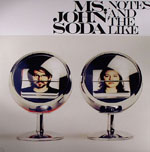
Ms. John Soda
Notes and the Like
(Morr; 2006)
By Dom Sinacola | 28 November 2007
In the following review, this critique of Ms. John Soda’s sophomore album Notes and the Like, expect that:
I will use expensive words—meticulous, deluge, demure, awash, ethereal, swathe, analog, crunchy, Kim Gordon, yumm(y/ilicious)—without much regard to pragmatism; I will repeatedly return to and rely on comparisons to instrumentalist Micha Acher’s more critically lauded band; I will subconsciously and lazily place “sexy” before any description of Couch member Stephanie Bohm’s vocal performances simply because she is a female that is attractive and sings; I will attempt to provide thematic cohesion to an album seemingly based on wandering epistemological rumination; I’ll totally hate on Bohm’s sing-speak; I shall look to the past with a jaded lament of discovery gone to die.
And now, get ready for an introductory panning of twee bloops, strong at left, crept to right, which incites little warm clusters of headphonophilic neurons to feel safe, reassured in Ms. John Soda’s and an Acher Brother’s maintained supremacy amidst Eastern European electro-pop.
Which means you can exhale, within the opening seconds of “A Nod on Hold,” because expectations are fulfilled. Then, forty minutes pass and all is well. Crunchy echo-garbage beats trade tracks with sunken snaps and lilting, processed glockenspiel. Live, sharp electric guitars pang nervously over ethereal synth terrain. Bohm’s vocals sometimes reach sexy, vibrato heights while sounding consistently breathless, her spoken passages eschewing the emotional intensity of, say, a Craig Finn, for the androidal monotone of, say, a “Fitter Happier.” A string quartet denotes balladry to space and vary the stabbing inclinations of post-punk in Acher’s guitars. A near uniformity of tempo juxtaposes smoothly with Bohm’s sexy legato, working most tracks into new-age simulacrums of Neon Golden’s “Pilot.” Alright, forty minutes is up.
Two things may become apparent, then. First, Notes and the Like fits perfectly into how Ms. John Soda should sound, a natural, if subtle, step from the duo’s hardier 2003 EP, While Talking, which had earlier takes of “No. One” and “Sometimes Stop, Sometimes Go.” The EP, the bridge between No P. Or D. and this recent record, indulged Bohm’s and Acher’s move towards more analog sound, as opposed to their debut album’s clean swathe of digital sheen. The new space they occupy can be seen most, I think, in the striking differences between the two versions of “No. One.” The EP’s frenzied, clamoring push and pull amps the guitars and the strife in Bohm’s voice. The lyrics, spoken instead of sung, mostly too inane or vague to matter much, lull around vitriolic foam in her mouth, mirroring Acher’s slide into distortion. The result is somewhat exciting, rollicking at least, and different from what was the band’s staple, mellow, ambient sound. Notes’s cut, while keeping to the lack of singing and saving the goth rock riff, is opened up substantially, the fervor of the original’s chorus reduced to simple snares and a bassy ripple. And this time, Bohm’s voice is as dead as a necrophiliac’s libido, calm, paced, and utterly alien. The white space, the softened attitude, the bland, repetitive vocals: the track is damned boring.
And second, Bohm’s demure alto is the focus. In fact, it’s always been the focus, because Micha Acher’s pop prowess has always been a constant and formidable force, but not that different, at all, from his work with the Notwist, leaving Bohm the task of separating the two projects. Maybe that’s not fair, and really, who could complain about more indelibly simple and gorgeous Notwist melodies? The distinction is in Acher’s purpose; today he masters moods, shifting between sodden and bright, between ramshackle and concise, but leaving the melodic heft squarely—besides a flat guitar line, not very exciting anyway—on his female counterpart’s shoulders. Which would work if Bohm’s melodies went anywhere, but mostly her choruses take alto responsibilities seriously and conservatively, tempering the yummy dips of No P. Or D. into monotonous, pleasant lullaby. Only in “A Million Times” and closer “Plenty Of” does her throat take a chance, and, predictably, these two are the album’s essential string ballads. It’s also worth noting the strange Elbow Asleep harmonizing throughout “Plenty,” or even the blistering jump up in octave she takes at the end of “Sometimes Stop, Sometimes Go,” but these moments slip away in the deluge of sameness.
One should note, too, Stephanie’s recent proclivity for “talking” over Acher’s arrangements. “Scan the Ways,” despite a bobbing staccato guitar, joins “No. One,” “Outlined View,” and “Sometimes Stop, Sometimes Go” in catering to Bohm’s static speaking voice. Really, it just needs to stop. She’s almost sharing a stage with a bad slam poetry competition, already sharing metaphysical ambiguity and relativity with many of those goobers. Kim Gordon, nope.
Everything in tow, Acher’s still a brilliant musician, and Bohm has the capacity to wreak some vicious vocal havoc. But now, fitting into a niche that they once helped epitomize, their record sounds stale. Undeniable is the pastoral prettiness of each and every song, even those buttressed by bleating pseudo-aggression, which has become a strength of the IDM/electro-pop/whatever variety. Awash with rich layers of sound, but minus the instantly accessible melodies of, say, the Notwist. Perhaps it’s just time to move forward, and not in barely discernible babysteps. We need redefinition, or the passivity this album thrives on may kill us. Or just help us appreciate New Buffalo. She’s much more yummilicious, that’s for sure.





